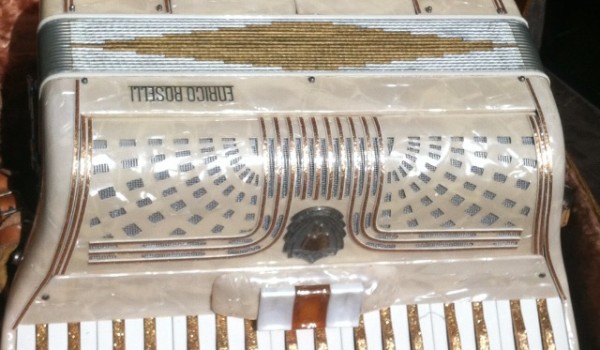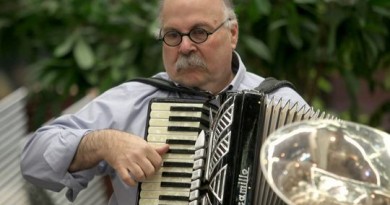The curse of the accordion
By Charles Andrews
Does this squeezebox make me look fat? I could have been a rock star
The timing was perfect. I was in high school when the British Invasion hit. No one was a very good musician yet, though there were some excellent songwriters, and if you picked up a guitar on Monday you could be rich and famous by the weekend.
I had one important, outstanding rock star talent: a willingness to let my hair grow long. My Catholic high school wouldn’t allow that, of course, but once I got out of there, it mushroomed enough for local rednecks cruising down Lomas Blvd. to yell obscenities and question my manhood. Screw ‘em. It took being drafted into the Army to touch that hair. (This may be unimaginable as an issue to anyone under the age of 40, but when “Easy Rider” came out at the end of the 1960s, all us hip hirsutes were looking nervously over our shoulders.)
But it was too late for me
I had already been scared (scarred) off the stage at the tender age of 13.
I’m not sure how I got talked into taking up the accordion at 8. All parents back then felt the obligation to torture — I mean, give their children the lifetime opportunity of music, so pick your instrument, kid, and you will practice every day no matter how many games of kick-the-can you have to skip.
The accordion seemed like a good idea at the time. Drums were out of the question, violin looked too difficult, we had no room for a piano, and when it came time to pick an instrument I chose the coolest accordion ever: Italian, metalflake gold keys on pearl, thick gold straps, 120 bass buttons, a carrying case lined with luxurious velvet. 300 bucks, I smashed the piggy bank and paid half.
Five years of torture
And I got pretty good. Real good. When Jim Purvis, who had a TV cowboy kiddies show, came calling to my accordion school band teachers asking for the best player, to duet with his daughter at one of his live stage shows, I was tapped. Trapped!
There were a few thousand people there at Tingley Coliseum, I messed up and was completely mortified and swore at that moment wild horses couldn’t drag me onto a stage again (and Purvis had some). I loved music but I wanted to be out there in the audience, hearing it. Writing about it . . .
I waited a month to announce my retirement, so my parents wouldn’t think, correctly, that “the incident” was to blame, and try to talk me out of it.
There was a kid at school named Bobby Anesi who took it up about the same time as I did. Couldn’t hold a Lady of Spain fan to my playing. But Bobby kept at it, and my mother would throw that Catholic guilt in my face every so often.
“You know, you can always pick it up again,” she would cajole. “Bobby Anesi is going to be able to work his way through college playing weddings and Bar Mitzvahs.”
Or, Mom, I could poke a sharp stick in my eye and get people to pay to look, to cover those college costs.
Sometimes she would trot out squeezebox superstar Myron Floren of the Lawrence Welk Show as something to shoot for.
“Don’t forget,” she would add as a deal-closer, (dancer) “Cissy King is from Albuquerque!”
If I had known about zydeco music then, my whole life could have been different.



